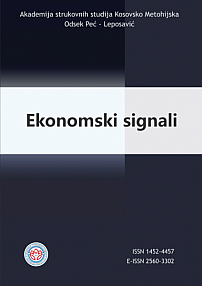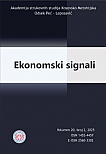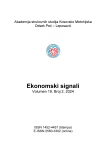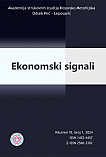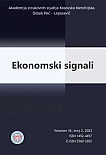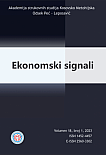Ekonomski signali
Business magazine Ekonomski signali Leposavić is categorized as a magazine of national importance in Serbia, which is published twice a year, in June and December.
In order to promote scientific research, the mission of the business magazine Ekonomski signali Leposavić is to publish quality empirical, theoretical, overview articles, professional articles and studies that contribute to better practice in economics as a part of social sciences.
Ekonomski signali is focused on a wide range of topics related to the state of the economy through the combination of science and practice.
All empirical methods, qualitative, quantitative, field studies, action research will be respected.
This journal "Ekonomski signali" has a broad platform for the exchange of ideas, academic and professional research and debate through the publication of articles of various genres.
Економски сигнали - Ekonomski signali
Frequency: 2 issues per year (June and December)
Start year: 2006.
Kosovo and Metohija Academy of Applied Studies
Выпуски журнала
Статьи журнала
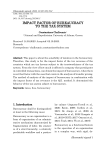
Impact factor of bureaucracy to the tax system
Статья научная
This paper is about the sensibility of taxation in the bureaucracy. Therefore, this study is for the impact factor of the tax revenues of the countries which are tax havens subject to the trustworthiness of the tax system. From the view of how much is affected a company that participates in controlled transactions, can obtain the impact of bureaucracy, when there is not that factor with the case that exists in the analysis of transfer pricing. The method of analysis of the impact of bureaucracy in combination with the impact factor of tax revenues is the Q.E. method. It determined the behavior of the tax system subject to bureaucracy.
Бесплатно
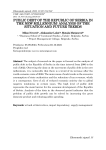
Статья научная
The subject of research in the paper is focused on the analysis of public debt in the Republic of Serbia in the time interval from 2000 to the end of 2022. Observing the data on the movement of public debt in the new millennium, it is noticeable that there is a trend of its increase after the world economic crisis of 2008. The main cause of such trends is the excessive consumption of state authorities and the reduction of tax revenues, which is a consequence, first of all, of reduced economic activity due to global negative tendencies in certain years. The high level of public debt represents the main barrier for the economic development of the Republic of Serbia. Analysis of the data in the observed period indicates that the problem of public debt growth can be solved by increasing the gross domestic product and reducing public spending.
Бесплатно
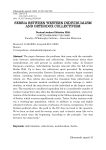
Serbia between western individualism and orthodox collectivism
Статья научная
The paper discusses the problems that come with the contradictions between individualism and collectivism. Discussions about these contradictions are still present in academic circles today. In Eastern European countries, individualism became relevant after the fall of the Berlin Wall. Up to then, the collectivist spirit prevailed. By accepting neoliberalism, post-socialist Eastern European countries began economic reform, including further educational reform, health reform, cultural reform, etc. This reform also meant the transition from collectivism to individualism because modern neoliberal capitalism belongs to individualism, in which the main focus is on the individual as the largest consumer. The transition to neoliberal capitalism led to a considerable number of workers losing their jobs after the liberalization, deregulation, and privatization of the Serbian economy, resulting in the lifeless demographic image of Serbia, which worsens significantly yearly. Today, Serbia remains without a working-age population, which, in addition to young and highly educated workers, also consists of artisans of various occupations. For the Serbian political elites, the path to the EU does not lead to the question. We've been on that road for twenty years, and it doesn't seem like we've moved much since the beginning. According to the principle, "one step forward, two steps back.".
Бесплатно
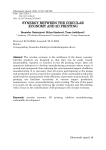
Synergy between the circular economy and 3D printing
Статья научная
The circular economy is the antithesis of the linear economy. Circular products are designed so that they can be easily reused, disassembled, repaired, or recycled. In the 3D printing sector, there are numerous initiatives to develop manufacturing processes where waste is reused and repurposed, thus reducing the environmental impact of additive manufacturing. It is necessary that all actors participating in the design and production process respect the principles of the sustainable production model and the maximization of the efficiency of processes and materials. 3D printing can facilitate circularity at various stages: production, maintenance, reuse, remanufacturing, and recycling. The aim of the paper is to point out the synergy between the circular economy and 3D printing, with a focus on the contributions of 3D printing to the circular economy.
Бесплатно
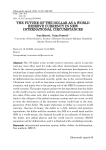
The future of the dollar as a world reserve currency in new international circumstances
Статья научная
The US dollar is the world's reserve currency, and it is also the currency most often used for trade and other international transactions. Due to the current geopolitical, economic and monetary developments, it is evident that a large number of countries are looking for ways to move away from the dominance of the dollar, as the leading world currency. The risk of de-dollarization has increased recently, partly due to the current Russian-Ukrainian crisis, as well as American economic sanctions against certain countries, and partly due to the growing role of the BRICS countries in the world economy. This paper argues and proves the hypothesis that the dollar as the world's reserve currency and the international monetary system are two sides of the same coin, that a complete loss of confidence in the dollar leads to the collapse of the global monetary system and vice versa, as well as that the destruction of the monetary system would lead to the disappearance of the dollar. The paper elaborates on dollar as a reserve world currency, theories of money, the dollar as a debt, deficits and monetary equivalents, the dollar and free markets, the IMF as a world bank and the SDR as a world money, the demand for gold as an indicator of distrust in the dollar, new global players and the world reserve currency, BRICS expansion and de-dollarization, and it is finalised with concluding remarks.
Бесплатно
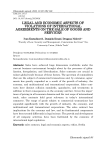
Статья научная
Sales have achieved huge dimensions worldwide under the current business environment brought about by the processes of globalization, deregulation, and liberalization. Sales contracts are crucial in today's global trade because of these factors. The spectrum of commodities that are the subject of commercial transactions and, by extension, agreements has greatly expanded as a result of the growth of industry, the economy, and multinational and transnational corporations. Sales contracts have distinct collision standards, quandaries, and treatments in addition to their consequences on the economy and law. Given the importance of pricing in all economic domains and the vast scope of international trade, sales contracts hold great relevance in today's international commerce. The range of goods subject to commercial transactions has expanded significantly with the growth of industry, the economy, and multinational and transnational corporations. The sales contract has implications for the economy and law, and its fundamental components have been treated differently in legal science. The growth and development of all company activities have been facilitated by the existence of international legal regulation.
Бесплатно

